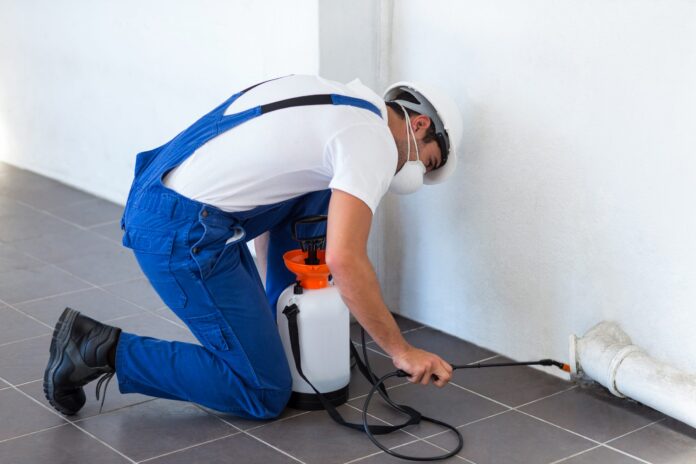Maintaining a pest-free home is crucial for the health and safety of your family. Pests not only disrupt your peace but can also pose significant health risks and damage your property. From ants and roaches to bed bugs and rodents, these unwelcome guests can invade your space if you’re not vigilant.
In this blog, let’s explore Fifteen effective pest control North Brisbane strategies to keep your home bug-free, ensuring you can enjoy a clean, safe environment.
Understanding Pests
Common Household Pests
To effectively control pests, it’s essential to understand the most common offenders. Here are a few:
- Ants: Often found in kitchens, ants are attracted to food sources. Their colonies can grow rapidly, leading to an overwhelming infestation if not managed.
- Cockroaches: Known for their resilience, cockroaches thrive in warm, humid environments and can reproduce quickly. They are carriers of diseases, making them a serious health concern.
- Bed Bugs: These tiny insects feed on human blood and can hide in mattresses, furniture, and cracks. Their bites can cause discomfort and lead to sleepless nights.
- Rodents: Mice and rats are not only a nuisance but can also cause significant damage to wiring and insulation, posing fire hazards.
The Impact of Pests
Pests can lead to various health risks, including allergies and diseases. For example, cockroaches can trigger asthma attacks, while rodents can carry diseases such as hantavirus and salmonella. Additionally, the structural damage caused by pests can lead to costly repairs, making effective pest control a necessity.
Prevention Strategies
1. Maintain Cleanliness
One of the most effective ways to prevent pest control Brisbane South is to maintain a clean home. Regular cleaning and decluttering can eliminate potential hiding spots for pests.
Kitchen and Pantry Organisation
- Clean Up Spills: Wipe up spills immediately, especially in the kitchen, where crumbs and food residue attract pests.
- Store Food Properly: Use airtight containers for grains, cereals, and snacks to prevent access to food sources.
- Regularly Empty Trash: Dispose of garbage regularly and use bins with tight-fitting lids.
2. Seal Entry Points
Pests can enter your home through the tiniest of openings. Inspect your home for cracks and crevices and seal them to block entry.
Identifying and Sealing Cracks
- Check Windows and Doors: Ensure that windows and doors close properly and that screens are intact. Replace any damaged screens.
- Seal Cracks in Walls: Use caulk or expanding foam to seal gaps in walls and around plumbing or electrical lines.
3. Proper Waste Management
Effective waste management is crucial in keeping pests at bay. Unsecured trash can be an open invitation to rodents and insects.
Sealed Garbage Bins
- Use Durable Containers: Invest in sturdy, pest-proof trash cans with tight-fitting lids.
- Compost Wisely: If composting, ensure that it is well-maintained and that it does not attract pests by mixing in dry materials and keeping it covered.
Natural Pest Control MethodsNatural pest control methods offer eco-friendly solutions to keep your home and garden safe from unwanted insects. By using techniques like companion planting, essential oils, and natural predators, you can maintain a healthy balance without harmful chemicals. These methods not only protect your plants but also promote biodiversity, ensuring long-term sustainability. Choose natural pest control for an effective, greener alternative that benefits both you and the environment.
4. Essential Oils
Using essential pest control North Brisbane oils can be a natural way to repel pests without harmful chemicals. Some oils, like peppermint and tea tree oil, are known for their pest-repelling properties.
How to Use Essential Oils
- Spray Mixtures: Combine water and a few drops of essential oil in a spray bottle and apply it to entry points or areas where pests are seen.
- Diffusion: Use an essential oil diffuser to spread the scent throughout your home, creating an unwelcoming environment for pests.
5. Homemade Traps
Creating DIY traps can effectively reduce pest populations without resorting to chemicals.
Simple DIY Traps
- Ant Traps: Mix equal parts of sugar and baking soda, placing the mixture in shallow dishes where ants are active. The sugar attracts them, while the baking soda kills them.
- Fruit Fly Traps: Fill a bowl with apple cider vinegar and cover it with plastic wrap, poking small holes. The fruit flies will be attracted to the vinegar but won’t be able to escape.
6. Natural Predators
Attracting natural pest control Brisbane South predators to your garden can help control pest populations.
Benefits of Beneficial Insects
- Ladybugs: These insects are natural predators of aphids and can help protect your plants.
- Spiders: While many people fear spiders, they are effective at controlling various pest populations, including flies and mosquitoes.
Chemical and Professional SolutionsChemical and professional solutions provide fast and targeted pest control for severe infestations. With expert application and advanced products, these methods effectively eliminate pests while minimising damage to your property.
Professional exterminators ensure safe handling of chemicals, reducing risks to humans and pets. For large-scale or persistent problems, chemical solutions offer a reliable, efficient approach to pest management.
7. Choosing Safe Chemicals
If natural methods aren’t sufficient, consider using safe, eco-friendly pest control products.
Eco-Friendly Pest Control Products
- Botanical Insecticides: These are derived from plants and can effectively eliminate pests while being less harmful to humans and pets.
- Integrated Pest Management (IPM): This approach combines various strategies, including biological control and chemical treatments, to minimise pesticide use.
8. When to Call Professionals
In some cases, DIY methods may not be enough. Recognising when to call in the experts is crucial.
Signs That Indicate a Professional Service is Necessary
- Severe Infestation: If you notice a significant increase in pest activity, professional intervention may be necessary.
- Damage to Property: Signs of damage to walls, wiring, or insulation could indicate a serious infestation that requires professional assessment.
Ongoing MaintenanceAfter professional pest control services have addressed an infestation, ongoing maintenance becomes vital to safeguard your space from future issues. Routine inspections by experts help detect any early signs of pest activity, ensuring quick and effective responses.
Additionally, adopting preventive practices like sealing potential entry points, proper waste management, and regular cleaning creates an inhospitable environment for pests. Consistent maintenance not only extends the effectiveness of the treatment but also preserves the health and safety of your property, providing peace of mind and long-term protection.
9. Regular Inspections
Conducting regular inspections of your home can help identify potential pest problems before they escalate.
Routine Checks for Signs of Pests
- Monthly Inspections: Check common areas for signs of pest activity, such as droppings, gnaw marks, or nests.
- Focus on Vulnerable Areas: Pay special attention to kitchens, bathrooms, and basements where pests are more likely to thrive.
10. Seasonal Preparations
Seasonal changes can bring new pest challenges. Preparing your home accordingly can help you stay ahead.
Tips for Seasonal Pest-Proofing
- Winterising Your Home: Before colder months, seal gaps around windows and doors and store firewood away from the house to prevent rodent access.
- Spring Cleaning: Conduct a thorough cleaning in the spring to remove any remnants of winter pests and prepare for the warmer months.
11. Use Mulch Wisely
Benefits of Mulching
While mulch is beneficial for gardens, it can attract pests if not used correctly. Here are some tips:
- Choose the Right Type: Avoid using organic mulch like wood chips, which can attract termites. Instead, opt for gravel or rubber mulch in high-risk areas.
- Keep Mulch Away from Foundations: Maintain a distance of at least 12 inches between mulch and your home’s foundation to reduce pest access points.
12. Maintain Outdoor Lighting
The Impact of Lighting on Pests
Outdoor lighting can attract a variety of pests, including insects. Here’s how to minimise this:
- Use Yellow Bug Lights: These lights are less attractive to insects compared to traditional white lights.
- Strategic Placement: Position lights away from entrances to discourage pests from approaching your home.
13. Monitor Plants and Landscaping
Regular Plant Checks
Your garden can be a hotspot for pests. Regular monitoring can help prevent infestations:
- Inspect Plants: Check for signs of pests or disease on leaves and stems. Early detection can prevent a larger outbreak.
- Diversity in Planting: Incorporate a variety of plants to deter specific pests. Certain plants can repel insects while attracting beneficial ones.
14. Store Firewood Properly
Firewood Storage Guidelines
Firewood can harbour pests like termites and ants. Proper storage is key:
- Elevate Firewood: Store firewood at least 18 inches off the ground to prevent moisture buildup and pest attraction.
- Keep It Away from the House: Place firewood stacks at least 20 feet from your home to minimise the risk of pests entering.
15. Educate Family Members
The Importance of Awareness
Educating your family about pest prevention can be one of the most effective strategies:
- Teach Children About Food Storage: Encourage kids to keep food sealed and to clean up after themselves.
- Discuss Signs of Pests: Help family members recognise signs of pests so they can report issues early, preventing larger infestations.
Final Words
A proactive approach to pest control is essential for maintaining a bug-free home. By implementing the ten strategies outlined above, you can significantly reduce the risk of infestations and create a safe, healthy environment for your family. Whether through cleanliness, sealing entry points, utilising natural remedies, or seeking professional help, taking these steps will empower you to combat pests effectively.
Remember, prevention is always easier and more cost-effective than dealing with a full-blown infestation. Share your pest control North Brisbane experiences or tips in the comments below, and let’s work together to keep our homes bug-free.
By adopting these strategies, you can enjoy a peaceful, pest-free home and protect your loved ones from the risks associated with unwanted intruders. Don’t wait until the problem escalates—take action today for a healthier, happier living space!
Maintaining a pest-free home is crucial for the health and safety of your family. Pests not only disrupt your peace but can also pose significant health risks and damage your property. From ants and roaches to bed bugs and rodents, these unwelcome guests can invade your space if you’re not vigilant.
In this blog, let’s explore Fifteen effective pest control North Brisbane strategies to keep your home bug-free, ensuring you can enjoy a clean, safe environment.
Understanding Pests
Common Household Pests
To effectively control pests, it’s essential to understand the most common offenders. Here are a few:
- Ants: Often found in kitchens, ants are attracted to food sources. Their colonies can grow rapidly, leading to an overwhelming infestation if not managed.
- Cockroaches: Known for their resilience, cockroaches thrive in warm, humid environments and can reproduce quickly. They are carriers of diseases, making them a serious health concern.
- Bed Bugs: These tiny insects feed on human blood and can hide in mattresses, furniture, and cracks. Their bites can cause discomfort and lead to sleepless nights.
- Rodents: Mice and rats are not only a nuisance but can also cause significant damage to wiring and insulation, posing fire hazards.
The Impact of Pests
Pests can lead to various health risks, including allergies and diseases. For example, cockroaches can trigger asthma attacks, while rodents can carry diseases such as hantavirus and salmonella. Additionally, the structural damage caused by pests can lead to costly repairs, making effective pest control a necessity.
Prevention Strategies
1. Maintain Cleanliness
One of the most effective ways to prevent pest control Brisbane South is to maintain a clean home. Regular cleaning and decluttering can eliminate potential hiding spots for pests.
Kitchen and Pantry Organisation
- Clean Up Spills: Wipe up spills immediately, especially in the kitchen, where crumbs and food residue attract pests.
- Store Food Properly: Use airtight containers for grains, cereals, and snacks to prevent access to food sources.
- Regularly Empty Trash: Dispose of garbage regularly and use bins with tight-fitting lids.
2. Seal Entry Points
Pests can enter your home through the tiniest of openings. Inspect your home for cracks and crevices and seal them to block entry.
Identifying and Sealing Cracks
- Check Windows and Doors: Ensure that windows and doors close properly and that screens are intact. Replace any damaged screens.
- Seal Cracks in Walls: Use caulk or expanding foam to seal gaps in walls and around plumbing or electrical lines.
3. Proper Waste Management
Effective waste management is crucial in keeping pests at bay. Unsecured trash can be an open invitation to rodents and insects.
Sealed Garbage Bins
- Use Durable Containers: Invest in sturdy, pest-proof trash cans with tight-fitting lids.
- Compost Wisely: If composting, ensure that it is well-maintained and that it does not attract pests by mixing in dry materials and keeping it covered.
Natural Pest Control MethodsNatural pest control methods offer eco-friendly solutions to keep your home and garden safe from unwanted insects. By using techniques like companion planting, essential oils, and natural predators, you can maintain a healthy balance without harmful chemicals. These methods not only protect your plants but also promote biodiversity, ensuring long-term sustainability. Choose natural pest control for an effective, greener alternative that benefits both you and the environment.
4. Essential Oils
Using essential pest control North Brisbane oils can be a natural way to repel pests without harmful chemicals. Some oils, like peppermint and tea tree oil, are known for their pest-repelling properties.
How to Use Essential Oils
- Spray Mixtures: Combine water and a few drops of essential oil in a spray bottle and apply it to entry points or areas where pests are seen.
- Diffusion: Use an essential oil diffuser to spread the scent throughout your home, creating an unwelcoming environment for pests.
5. Homemade Traps
Creating DIY traps can effectively reduce pest populations without resorting to chemicals.
Simple DIY Traps
- Ant Traps: Mix equal parts of sugar and baking soda, placing the mixture in shallow dishes where ants are active. The sugar attracts them, while the baking soda kills them.
- Fruit Fly Traps: Fill a bowl with apple cider vinegar and cover it with plastic wrap, poking small holes. The fruit flies will be attracted to the vinegar but won’t be able to escape.
6. Natural Predators
Attracting natural pest control Brisbane South predators to your garden can help control pest populations.
Benefits of Beneficial Insects
- Ladybugs: These insects are natural predators of aphids and can help protect your plants.
- Spiders: While many people fear spiders, they are effective at controlling various pest populations, including flies and mosquitoes.
Chemical and Professional SolutionsChemical and professional solutions provide fast and targeted pest control for severe infestations. With expert application and advanced products, these methods effectively eliminate pests while minimising damage to your property.
Professional exterminators ensure safe handling of chemicals, reducing risks to humans and pets. For large-scale or persistent problems, chemical solutions offer a reliable, efficient approach to pest management.
7. Choosing Safe Chemicals
If natural methods aren’t sufficient, consider using safe, eco-friendly pest control products.
Eco-Friendly Pest Control Products
- Botanical Insecticides: These are derived from plants and can effectively eliminate pests while being less harmful to humans and pets.
- Integrated Pest Management (IPM): This approach combines various strategies, including biological control and chemical treatments, to minimise pesticide use.
8. When to Call Professionals
In some cases, DIY methods may not be enough. Recognising when to call in the experts is crucial.
Signs That Indicate a Professional Service is Necessary
- Severe Infestation: If you notice a significant increase in pest activity, professional intervention may be necessary.
- Damage to Property: Signs of damage to walls, wiring, or insulation could indicate a serious infestation that requires professional assessment.
Ongoing MaintenanceAfter professional pest control services have addressed an infestation, ongoing maintenance becomes vital to safeguard your space from future issues. Routine inspections by experts help detect any early signs of pest activity, ensuring quick and effective responses.
Additionally, adopting preventive practices like sealing potential entry points, proper waste management, and regular cleaning creates an inhospitable environment for pests. Consistent maintenance not only extends the effectiveness of the treatment but also preserves the health and safety of your property, providing peace of mind and long-term protection.
9. Regular Inspections
Conducting regular inspections of your home can help identify potential pest problems before they escalate.
Routine Checks for Signs of Pests
- Monthly Inspections: Check common areas for signs of pest activity, such as droppings, gnaw marks, or nests.
- Focus on Vulnerable Areas: Pay special attention to kitchens, bathrooms, and basements where pests are more likely to thrive.
10. Seasonal Preparations
Seasonal changes can bring new pest challenges. Preparing your home accordingly can help you stay ahead.
Tips for Seasonal Pest-Proofing
- Winterising Your Home: Before colder months, seal gaps around windows and doors and store firewood away from the house to prevent rodent access.
- Spring Cleaning: Conduct a thorough cleaning in the spring to remove any remnants of winter pests and prepare for the warmer months.
11. Use Mulch Wisely
Benefits of Mulching
While mulch is beneficial for gardens, it can attract pests if not used correctly. Here are some tips:
- Choose the Right Type: Avoid using organic mulch like wood chips, which can attract termites. Instead, opt for gravel or rubber mulch in high-risk areas.
- Keep Mulch Away from Foundations: Maintain a distance of at least 12 inches between mulch and your home’s foundation to reduce pest access points.
12. Maintain Outdoor Lighting
The Impact of Lighting on Pests
Outdoor lighting can attract a variety of pests, including insects. Here’s how to minimise this:
- Use Yellow Bug Lights: These lights are less attractive to insects compared to traditional white lights.
- Strategic Placement: Position lights away from entrances to discourage pests from approaching your home.
13. Monitor Plants and Landscaping
Regular Plant Checks
Your garden can be a hotspot for pests. Regular monitoring can help prevent infestations:
- Inspect Plants: Check for signs of pests or disease on leaves and stems. Early detection can prevent a larger outbreak.
- Diversity in Planting: Incorporate a variety of plants to deter specific pests. Certain plants can repel insects while attracting beneficial ones.
14. Store Firewood Properly
Firewood Storage Guidelines
Firewood can harbour pests like termites and ants. Proper storage is key:
- Elevate Firewood: Store firewood at least 18 inches off the ground to prevent moisture buildup and pest attraction.
- Keep It Away from the House: Place firewood stacks at least 20 feet from your home to minimise the risk of pests entering.
15. Educate Family Members
The Importance of Awareness
Educating your family about pest prevention can be one of the most effective strategies:
- Teach Children About Food Storage: Encourage kids to keep food sealed and to clean up after themselves.
- Discuss Signs of Pests: Help family members recognise signs of pests so they can report issues early, preventing larger infestations.
Final Words
A proactive approach to pest control is essential for maintaining a bug-free home. By implementing the ten strategies outlined above, you can significantly reduce the risk of infestations and create a safe, healthy environment for your family. Whether through cleanliness, sealing entry points, utilising natural remedies, or seeking professional help, taking these steps will empower you to combat pests effectively.
Remember, prevention is always easier and more cost-effective than dealing with a full-blown infestation. Share your pest control North Brisbane experiences or tips in the comments below, and let’s work together to keep our homes bug-free.
By adopting these strategies, you can enjoy a peaceful, pest-free home and protect your loved ones from the risks associated with unwanted intruders. Don’t wait until the problem escalates—take action today for a healthier, happier living space!




